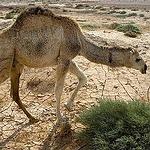一位荷蘭科學家的最新研究發現,敘利亞2006年至2010年間的乾旱肆虐,是因為長久以來當地政府未能理性管理水資源,並確實執行環境和水資源管理法規,導致資源耗盡,進而成為國內分裂衝突的導火線。
農業政策不當 耗盡自然資源
荷蘭奈梅亨大學學者Francesca de Châtel發表在當期《中東研究》期刊的論文指出,「點燃敘利亞農村長期以來不滿情緒的導火線並非旱災本身,而是政府未能妥善處理旱災造成的人道危機。」
De Châtel解釋,旱災災情最嚴重的東北部地區是敘利亞最貧窮、最被忽視的地區,但同時也是敘利亞的米倉和石油來源。「2000年以來,這裡地下水源耗盡,一系列野心過度膨脹的農業發展計畫,讓土地資源和水資源捉襟見肘,加速貧窮惡化。2006年來襲的旱災只是壓垮駱駝的最後一根稻草。」
 過度放牧導致土地快速沙漠化;為轉型成社會市場經濟而取消柴油和肥料津貼,反使農村貧窮惡化;許多家庭放棄農業,轉往城市尋找工作機會。「敘利亞農村社群權利被剝奪的不滿情緒持續升高」,de Châtel寫道。
過度放牧導致土地快速沙漠化;為轉型成社會市場經濟而取消柴油和肥料津貼,反使農村貧窮惡化;許多家庭放棄農業,轉往城市尋找工作機會。「敘利亞農村社群權利被剝奪的不滿情緒持續升高」,de Châtel寫道。
「2006至2010年大旱後隨之而來的人道危機,可說是50年水土資源不當管理的惡果,敘利亞水利農業政策的死胡同。」De Châtel認為,為「不擇手段追求農業輸出和擴張灌溉農田」,讓政策制定者盲目地耗盡國家資源。
水資源管理成「不可說」 黑箱作業引戰爭
相較於其他中東北非國家,敘利亞在阿塞德政權之下,公眾難以取得精準即時的水資源和運用資訊,水資源基本上是一個不可討論的議題。De Châtel的論文嚴厲批判敘利亞政府此種黑箱態度:「不管是在公共領域還是政府層級,水資源都是不能被觸碰的敏感神經,任何策略考量和各種層級的水資源管理都是如此。」
「政府對於乾旱的處置就是淡化處理,接著否定人道危機的存在或是怪罪於外部因素,此種思維已影響敘利亞水政策的各種制定面以及執行面。」de Châtel說。
和其他中東北非國家一樣,有限的水資源攸關國家安全,是一種策略性的資源。敘利亞自然資源管理不當,已釀成毀滅性的戰爭。2011年3月德拉市首次舉行抗議,原本對抗阿塞德政權的和平起義,2年多後卻演變成超過130,000人死亡、超過500,000人受傷的流血衝突。2013年死亡人數最多,總計約73,000人。據聯合國資訊,至少有2百40萬難民逃往埃及、土耳其或更遠處。
The long drought that gripped Syria from 2006 through 2010 was a trigger of the conflict that has torn the country apart with devastating consequences, finds new research from a Dutch scientist.
Writing in the current issue of the journal “Middle Eastern Studies,” Francesca de Châtel of Radboud University in the Netherlands explains that “it was not the drought per se, but rather the government’s failure to respond to the ensuing humanitarian crisis that formed one of the triggers of the uprising, feeding a discontent that had long been simmering in rural areas.”
The drought hit hardest in the northeast, the most impoverished and neglected part of the country, which was also the country’s breadbasket and source of oil, explains de Châtel.
“Since 2000, this region has been rapidly sinking further into poverty as groundwater reserves were depleted and a series of overambitious agricultural development projects overstretched both land and water resources. The drought that struck in 2006 merely formed a final coup de grace,” she writes.
“The humanitarian crisis that followed the 2006-10 drought can thus be seen as the culmination of 50 years of sustained mismanagement of water and land resources, and the dead end of the Syrian government’s water and agricultural policies,” writes de Châtel.
It is de Châtel view that the “relentless drive to increase agricultural output and expand irrigated agriculture” blinded policy makers to the limits of the country’s resources.
Overgrazing caused rapid desertification; the cancellation of subsidies for diesel and fertilizer as part of a botched transition to a social-market economy increased rural poverty; and many families abandoned their farms for the cities in search of work, she writes.
In short, says de Châtel, the “ongoing failure to rationalize water use and enforce environmental and water use laws” has depleted resources and caused “growing disenfranchisement and discontent in Syria’s rural communities.”
This destruction of Syria’s natural resources has led to a devastating war. More than two years after the first protests in the rural town of Dara’a in March 2011, what started as a peaceful uprising against the Assad regime has resulted in the deaths of more than 130,000 people, with more than 500,000 wounded. The year 2013 was the deadliest, with 73,000 fatalities.
At least 2.4 million refugees have fled to Egypt, Turkey and beyond, according to the United Nations.
In her study, de Châtel is particularly critical of the culture of secrecy that surrounds the subject of water within the Syrian government.
“Water has become a taboo that is reluctantly discussed, not only in the public domain but also at government level,” she writes. “In Syria the fixation on water as a ‘sensitive’ issue has extended far beyond strategic considerations and covers all levels of water management.”
“The government’s response to the drought – attempts to downplay it and subsequently deny the humanitarian crisis or blame it on externalities – is part of a mindset that influences all aspects of policy making and implementation in the Syrian water sector,” writes de Châtel.
As in many other countries in the water-scarce Middle East-North Africa region, water is considered a strategic resource that pertains to national security. As a result, accurate and up-to-date information on water availability and use is not readily available to the general public, she explains.
Yet the Assad regime has taken this security concern much farther than other governments in the region.
※ 全文及圖片詳見:ENS






